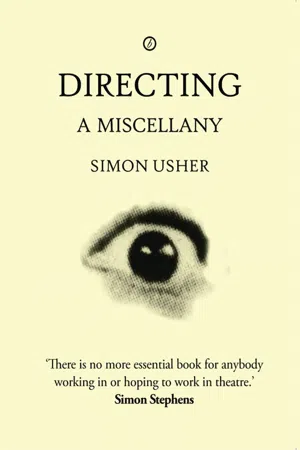![]()
I
Productions must be ‘sharp in form, profound in content’ [Vakhtangov]
Vakhtangov also said: ‘Before he can start rehearsing, a director has to live [play] all the roles in his mind.’
But everyone wants to be a director now. If only they knew.
Only direct if you can do nothing else.
Directors are charlatans. This does not mean there are not good and bad directors.
Directors should be neither ‘great’ nor ‘good’.
Directing. Acting. Design. Lighting. An ensemble of effects.
Is it time to consign Mr Cockroach and Miss Armalite to the graveyard?
‘Make sure you have the illness,’ observed the director Peter Gill in 1980.
Directing is first of all about grasping the size of the canvas required. In other words it is a question of scale.
Nowadays there is something in the theatre called NEW WRITING. This does not mean it is GOOD WRITING.
The great English director John Dexter once said to me that my production of Rattigan’s French Without Tears on a huge thrust stage had turned, ‘a ping-pong game into a tennis match.’ This made me unconsciously happy.
Unfortunately our impulses are mostly repetitive. Character development is probably a fiction of playwrights, actors and directors. Wisdom, sympathy, knowledge, these develop. But that is not the same.
An instruction is not the same as an opinion. You must insist on the difference when directing.
Directors: people with incurable cases of writer’s block.
Direct plays whose authors know more than you do.
You need deep water to swim well.
Complicate the psychology: simplify the action.
Make the actor think of himself or herself alone: then connect him to some, and finally to all the others.
When directing a new play you must protect the writer from the ‘best intentions’ of the actors.
What is an ideal production?
‘The cathedral you can hold in your palm.’
[Jacques Copeau]
Our theatre stays in the shallows. Can you see the little box of approved social and personal axioms placed close to the water’s edge.
‘A democracy based on the rule of opinion.’ [Paul Virilio] – The rehearsal room?
An actress playing Hermione need not visit pre-natal classes.
An actor playing Macbeth hardly needs a visit from a murderer. After all, what can the actor tell him?
Look for the chorus in whatever form it appears.
The Actor: ‘I know what it means.’
The Director: ‘Yes, maybe, but it’s how it means what it means…’
‘My thoughts are fix’d on other ends.’
Annabella in ’Tis Pity She’s a Whore: the Emily Dickinson of dramatic literature?
Are there ever unclouded motives, intentions? Only in acting classes.
A friend of mine, whom I directed as Lucky in Waiting for Godot, said he was depressed for many months afterwards. I think this was the right response; in fact it is admirable and rare nowadays, when even depression is meant to be fun.
A cinematic approach to directing plays is not the same thing as trying to abolish the difference between theatre and cinema. That shouldn’t be attempted.
Everyone thinks they can do your job.
Remember, they can’t.
If the public as a whole were concerned about the well-being of the theatre, they would be scandalised by the way it is run.
You cannot fill 900 seats at a regional theatre now. And yet you are judged on your ability to do so. If your face doesn’t fit, that is.
Company work: a conversation about life, not a rehearsal of prescribed attitudes towards it.
The business of dying on stage in mise-en-scène and performance is a huge responsibility for director and actor alike. Some of the spectators will be closer to it than others, but no one is exempted. The trouble here is that many actors, particularly younger ones, seem not to believe in death. They wearily intone ‘die, die, die,’ as they crumple up on the rehearsal room floor. The jargon for this is ‘marking’. Rest assured, our lives will be marked by death.
Do not fear silence. The ‘theatre of silence’ has a distinguished history.
When an actor keeps reassuring you that he or she will know their lines on opening night, then you know you are in trouble.
An increasingly little known fact: a theatre director who doesn’t cast each part is not a director.
When I arrived at Coventry as Joint Artistic Director I noticed there were scores of people on the staff. Yet the place was virtually empty, and a mist of neglect hung over it.
Convert your insights into a set of instructions for the actor.
Acting is becoming detached from plays. Now it is mostly imported goods.
When an actor thanks you for your ‘help’, remain calm.
When today’s Shakespeareans drop their trousers and wave their arses at you, just look the other way.
In this country we leave school in our teens: but they send directors back in middle age.
Expect to be trampled on and bloodied. The sacrifice is worthwhile provided your body and mind are pointing in the right direction.
Know the difference, from an actor’s point of view, between Shakespeare and Middleton, or Webster and Marston. Each makes a different and unique demand on the actor.
You have to thoroughly absorb a play on your own to penetrate the thoughts behind the thoughts. Too often a rehearsal is a debate and, what’s more, a debate happening in the wrong place at the wrong time.
The cult of management has forced the theatre to betray its true nature.
When I s...




